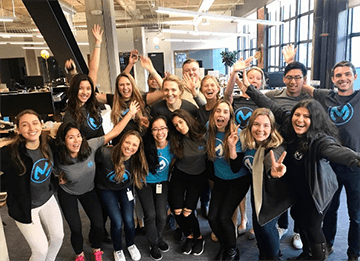I have wanted to be a salesperson ever since a Silicon Valley CEO guest lectured my favorite college class at UC Berkeley. “We’re always selling,” she said. “If you want to be a leader of any kind of organization, you need to build credibility and learn how to influence people.” I knew I wanted to be a leader, so I figured that that launching my career in a sales organization would challenge my intellect, broaden my understanding of business, and kick my comfort zone to the curb. What I didn’t know and learned the hard way, however, is that not all sales jobs are created equal.
I wasn’t picky when looking for my first job after school. I took the first “good job”–– a good logo with a well-established training program. What dawned on me after 10 grueling months is that I was stuck in a boiler room with no path out. The company measured me on activity metrics, such as how well I could memorize product features and benefits, and if I could handle a few simple objections. Rinse, wash, repeat. I quickly began to feel like a machine on autopilot rather than a budding professional salesperson.
I finally decided I needed to look elsewhere.
Many of my friends in sales roles at other companies described similar experiences, so I was a little wary of jumping ship before doing my homework. While researching companies on LinkedIn, I stumbled upon my now-colleague Ian McPherson’s brilliant blog post about the unique Account Development organization at MuleSoft.
The blog post highlights the unusual culture of MuleSoft’s sales organization, where there’s a heavy investment in training a deliberately non-transactional approach. The quote that got me was that the Account Development role is, “an intellectually challenging position where you’re rarely in your comfort zone;” He went on to talk about the “un-salesy” culture and opportunity to influence transformational outcomes across industries. That’s exactly what I was looking for, too.
Now that I’ve been part of the Account Development team for a year, I am confident that I made the right switch. There are countless things that make this team different; to provide you some insight, I will highlight the top 3.
1. Outcome-based approach
A recent World Economic Forum report shows that we’re entering an outcome-based economy. Companies will shift from competing through selling products and services to competing on delivering measurable outcomes to the customer. This differs from “tactical selling,” or highlighting product features and benefits, and quantitative measures behind why we buy.
For instance, if I were selling to a hospital in a tactical way, I might emphasize that our product could connect their systems faster and cheaper than a competitive product. However, if I were selling in an outcome-based way, I would talk about how we helped a similar hospital network like Mount Sinai Health System reduce the amount of time required to interface with partner organizations by over 50%, leading to a 41% reduction in patient readmission rates and $25M in penalty fee savings.
The first approach might get my prospect to take a second meeting if there was some true pain with their existing technology, but the second approach demonstrates to the customer that if they also want to reduce patient readmission rates and save millions of dollars, then they might need to rethink how they are approaching their projects. In other words, the second approach opens up a different kind of conversation, and allows a company to transition from “a vendor” to a true partner.
Sounds simple enough, but outcome-based selling is hard. Certainly, it requires skill, but it also requires the right enablement and resources. Many traditional sales teams arm their reps to the teeth with feature-based battle cards, but skimp on teaching reps how to draw the linear path from a business outcome to a specific technology initiative and how the product can further that initiative.
At MuleSoft we do that, and much more. Our month-long Tech Sales MBA program and continuous enablement sessions focus on helping us mastering the outcome-based sale. We’re armed with a library of quantifiable business outcomes across different customers and industries, so we’re able to challenge prospects to think differently about their business and the role MuleSoft will play in delivering their business outcomes.
Instead of challenging prospects on what technology they’re currently using, we can leverage these customer outcomes to challenge prospects on their approach to delivering projects whether it’s a new mobile app, an omnichannel strategy, or a cloud initiative. It’s complex and takes critical thinking, but this outcome-based strategy is often more effective and fun than tactical selling.
2. Strategic nature of the role
MuleSoft’s Account Development representatives are far beyond “meeting bookers.” Our job is to uncover the “disruptive forces” that are shaping company decision-making, architecting a provocative point of view about how we can influence outcomes, and then convince key decision-makers that we can put our money where our mouth is. We’re using all tools at our disposal to create opportunity, including social networks, third-party partners, events, workshops, and straight-up elbow grease.
Our sales team has to be strategic because our product is strategic. We’re driving a serious organization-wide improvement for companies like Spotify, Unilever, and ASICS. It’s up to the Account Development team to communicate how we do that and align that methodology to business outcomes.
We collaborate with the entire field organization to achieve this. For example, we work closely with the marketing team to generate demand, qualify leads, and ensure the right messaging gets to our prospects. We also work closely with our Account Executives to map out the key stakeholders in our book of business, find and educate quality prospects, and reframe prospects to drive urgency or think about their business challenges differently. We also work with the Channels team to drive demand through additional avenues and gain leverage through our partners.

Because we touch almost every part of the field organization, we have a lot of opportunities to identify gaps and drive impact beyond our core role. In fact, 25% of our team is getting promoted into new business functions on the Field Sales, Customer Success, Solutions Consulting, Channels, and Marketing teams. We simply wouldn’t have these opportunities if we were just “throwing meetings over the fence” and going home at the end of the day. We’re just as scrubbed-in as every other function, working to reframe prospects, evangelize MuleSoft, and communicate the transformational outcomes we could enable for their businesses.
3. Team values
Our team comes from all walks of life––from ex-soldiers and investment bankers to engineers and professional athletes. Still, we are glued together with a shared set of traits and values, including grit, fearlessness, and a “learner mindset.” Individuals on our team are recognized every month for embodying these values. A few examples include:
- Embodying grit by tenaciously messaging Fortune-100 C-level executives. Then, fearlessly leading meetings with these folks to source opportunities for the business.
- Identifying operational gaps and spearheading new processes to help our team be successful.
- Demonstrating commitment to excellence with weekly deliberate practice, attending sales summits, and bringing in national sales leaders to coach the team.
The list could go on and on. As a young person starting my business career, I’m continuously inspired by the individuals I work with who push me to stretch further than I could have possibly imagined during college. Because my teammates are constantly living outside of their comfort zones, I too strive to live outside of mine. We’re held to a standard of excellence unlike any other, since our job is to drive a different type of conversation with folks who have been in the business as long as many of us have been alive. It’s pretty compelling work.

I don’t know what my career will look like, nor those of my peers. What I know for sure is that whether I end up in the field or running my own company, I’m spending the early part of my career maniacally focused on challenging my intellect, understanding businesses across industries, and mastering grit. I’ll be armed with critical skills for driving a different type of conversation to help organizations understand how to drive change in their businesses.
If I ever run into that inspiring CEO who spoke to my class one fateful day back in college, I’ll know that I did everything I could to heed her advice. Maybe I’ll even follow in her footsteps by inspiring another saleswoman.
If you’re looking to launch your career in a role that will teach you the ins and outs of the business world, consider a role in Sales. We’re always looking for exceptional people with a passion for selling on the Account Development team! Drop me a note, or apply to any of our open roles all over the world.









